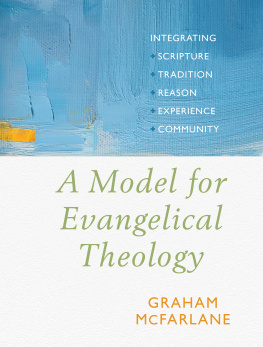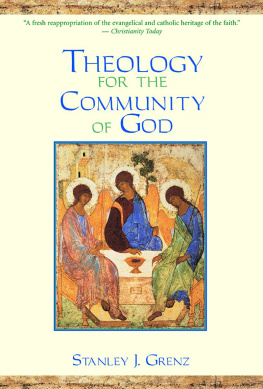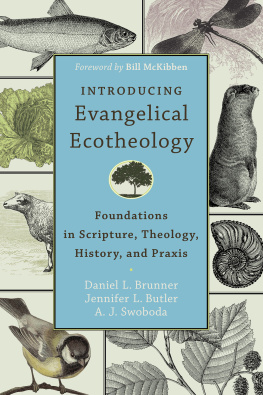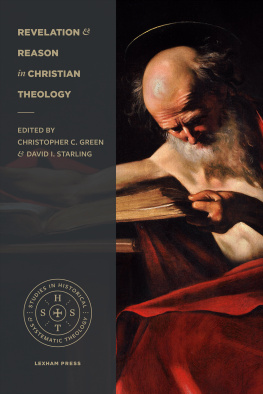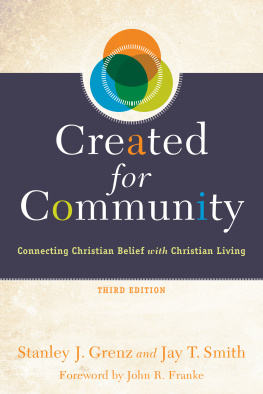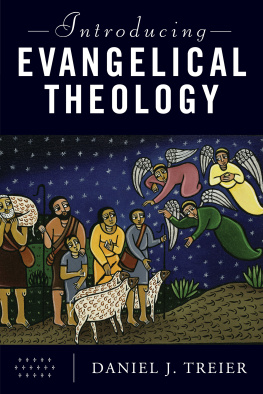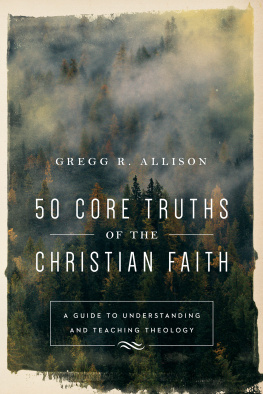Endorsements
Clear and accessible, this book serves evangelical students and church people alike. McFarlane guides readers to help them to form their theological commitments and articulation, andwhile he draws on a range of thinkershe never deviates from conclusions and discussions which are textured by evangelical theological commitments and emphases. This is a good introduction for any evangelical wishing to think more about the faith in which they so passionately believe: it opens up the vast horizons of theological wisdom which can be explored in praise and love of God for all eternity.
Tom Greggs , FRSE, University of Aberdeen
Like the wise steward in Jesuss parable, Graham McFarlane brings out of the storehouse things old and new. A Model for Evangelical Theology presents the best insights from a wealth of theological sources, creatively woven into a fresh presentation that is a manifesto for the theological endeavor and, more importantly, a celebration of the high vocation of the evangelical theologian. McFarlane rehabilitates the Wesleyan Quadrilateral as an Evangelical Quintilateral, adding community to Scripture, tradition, reason, and experience, arguably bringing out what Wesley himself emphasized: that theology is only possible in the presence of God and of all others with whom we are formed and transformed. This is innovation on the theological tradition at its energizing best.
Andrew Stobart , Wesley House, Cambridge
At a time when the word evangelical is increasingly misunderstood or politicized, McFarlanes comprehensive and systematic account of an evangelical theological method is a breath of fresh air. His writing is clearly the product of decades of teaching theology, allowing curiosity and questioning to shape his approach, engaging heart and mind in equal measure. McFarlanes proposal of community as a fifth dimension to the method of evangelical theology places theology right where it should beat the heart of the church, and as the calling not of the academic elite but of all who are baptized into the body of Christ. This book will not only deepen your understanding of the foundations of your faith but also increase your love for the God of the gospel and his mission in the world today.
Hannah Steele , St. Mellitus College, London
A preoccupation with theological method has been described as clearing ones throat. If that is true, Graham McFarlane has accomplished this so well that those who read this book will speak with a more profound theological voice. McFarlane provides us with a truly evangelical prolegomena that goes further and deeper than anything that has been published, unpacking five dimensions of the theological enterprise in the company of a wide range of practitioners. He dissects, clarifies, and exemplifies the process of theological thinking that will assist us in remaining true to the Word and relevant to the human situation.
Dennis Okholm , Azusa Pacific University; author of Learning Theology through the Churchs Worship
McFarlane provides a much-needed critical-confessional model for evangelical theology revisited for the ecclesial realities of the twenty-first century. Thoughtfully engaging Albert Outlers descriptive Wesleyan Quadrilateral of Scripture, tradition, reason, and experience, McFarlane offers a systematic consideration of theology that is almost abandoned or at least overlooked in evangelical discussions. I highly recommend this book for students and individuals seeking a model for theology that is robustly evangelical and relevant for theological engagement today.
Joy J. Moore , Luther Seminary
Title Page
Copyright Page
2020 by Graham McFarlane
Published by Baker Academic
a division of Baker Publishing Group
PO Box 6287, Grand Rapids, MI 49516-6287
www.bakeracademic.com
Ebook edition created 2020
All rights reserved. No part of this publication may be reproduced, stored in a retrieval system, or transmitted in any form or by any meansfor example, electronic, photocopy, recordingwithout the prior written permission of the publisher. The only exception is brief quotations in printed reviews.
Library of Congress Cataloging-in-Publication Data is on file at the Library of Congress, Washington, DC.
ISBN 978-1-4934-2236-4
Unless otherwise indicated, Scripture quotations are from THE HOLY BIBLE, NEW INTERNATIONAL VERSION, NIV Copyright 1973, 1978, 1984, 2011 by Biblica, Inc. Used by permission. All rights reserved worldwide.
Scripture quotations labeled The Message are taken from THE MESSAGE , copyright 1993, 2002, 2018 by Eugene H. Peterson. Used by permission of NavPress. All rights reserved. Represented by Tyndale House Publishers, Inc.
Dedication
To my wife, Hilary
Contents
Cover
Endorsements
Title Page
Copyright Page
Dedication
Preface
Part 1: Evangelical Theology and Its Method
1. Framing the Skill of Being a Theologian
2. Working Definition
3. The Relational and the Revelational
Part 2: An Integrated Model for Evangelical Theology
5. Scripture
6. Tradition
7. Reason
9. Community
Conclusion: The Quintilateral as a Dynamic Theological Method
Notes
Bibliography
Index
Back Cover
Preface
Lovers are the ones who know most about God; the theologian must listen to them.
Hans Urs von Balthasar, Love Alone Is Credible
T his is a book I have wanted to write for nearly three decades. It has taken me this long to understand why systematic theologians are advised to publish only toward the end of their lecturing years. It probably takes us this length of time not only to identify the issues facing the contemporary church but also to propose a mature solution. After all, we only get one shot per annum at giving our lectures, so we develop them, and then, in the busyness of academia, file them for the next year. I am a natural evangelicalI have too much energy for my own good, I like quick solutions, and I prefer action to reflection. Theological method was simply a distraction from getting on with the job! Indeed, being Scottish, I knew that there were superb faculties of divinity in my homeland that would earth a student in this skill for an entire first year of undergraduate studies, if this is what was desired.
My fascination with theological method began when I spent a research sabbatical at the hospitality of Asbury Theological Seminary in Kentucky. It was a privilege to spend time with Wesleyans and Methodists. In addition to discovering a gentle and deeply holistic spirituality, I was struck by their commitment to a theological method premised on John Wesleys approach. While Wesleyan scholars have now moved on from this position, on the whole, exposure to what has come to be known as the Wesleyan Quadrilateral did its damage to me! I became aware of theological method permeating every aspect of faith . As a result, I also became all too aware of the inadequacy of my own theological tradition and training in particular and, in general, the wider inadequacy of evangelical theology to address the mercurial nature of early twenty-first-century Western culture. Evangelicalism is, after all, a product of modernity and is ill fitted to the vagaries of postmodernity, let alone post-Christendom.
This awareness set me on a personal and professional inquiry: What might a specifically evangelical theological method look like? I quickly discovered just how difficult it was to convince othersin this instance my colleaguesthat this was an issue worth putting in an evangelical theological curriculum. What galvanized my inquiry into the possibility of teaching an evangelical theological method was the challenge presented to the faculty at London School of Theology (LST) by the board of governors to come up with a new MA program. It became clear very quickly to me that there was no MA program in theological method for evangelical students. So, being in the position to pursue this trajectory, I convinced my faculty colleagues that an MA in evangelical theological method was worth developing. Over a period of several months, we pulled on our expertise and worked collaborativelyeven joined by my colleague Conrad Gempf, whose Lutheran theology resists such approaches to theologyand eventually we created an MA in integrative theology. If this book ignites a theological flame, then know you can take it further at LST!

